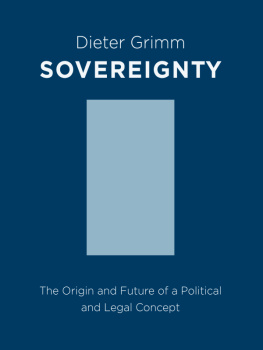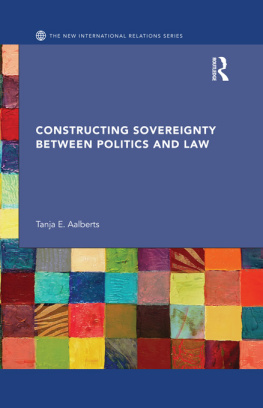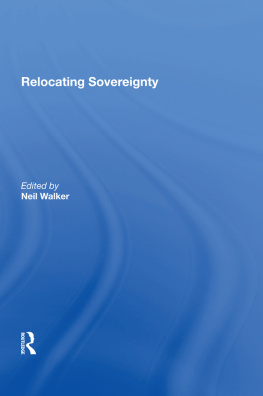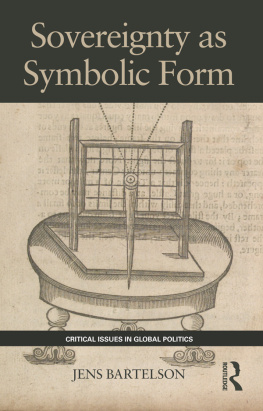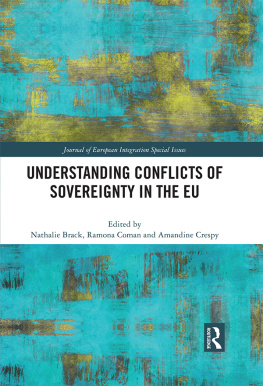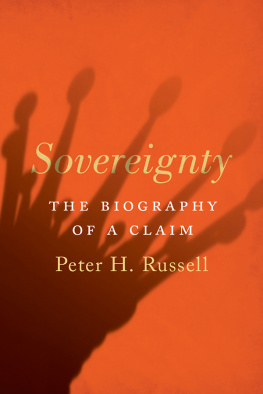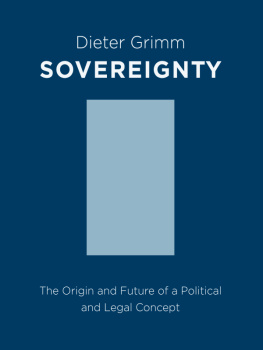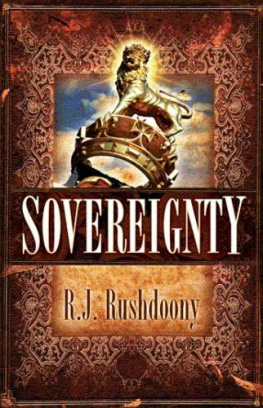SOVEREIGNTY
Columbia Studies in
Political Thought / Political History
Columbia Studies in Political Thought / Political History
Dick Howard, General Editor
Columbia Studies in Political Thought/Political History is a series dedicated to exploring the possibilities for democratic initiative and the revitalization of politics in the wake of the exhaustion of twentieth-century ideological isms. By taking a historical approach to the politics of ideas about power, governance, and the just society, this series seeks to foster and illuminate new political spaces for human action and choice.
For the list of titles in this series see .
The translation of this work was funded by Geisteswissenschaften InternationalTranslation Funding for Work in the Humanities and Social Sciences from Germany, a joint initiative of the Fritz Thyssen Foundation, the German Federal Foreign Office, the collecting society VG WORT, and the Brsenverein des Deutschen Buchhandels (German Publishers & Booksellers Association).
SOVEREIGNTY
The Origin and Future of a Political and Legal Concept
Dieter grimm
Translated by Belinda Cooper
COLUMBIA UNIVERSITY PRESS
New York
Columbia University Press
Publishers Since 1893
New York Chichester, West Sussex
cup.columbia.edu
Copyright 2009 Berlin University Press
Copyright 2015 Columbia University Press
All rights reserved
E-ISBN 978-0-231-53930-2
Library of Congress Cataloging-in-Publication Data
Grimm, Dieter, 1937
[Souvernitt. English]
Sovereignty: the origin and future of a political and legal concept / Dieter Grimm;
Translated by Belinda Cooper.
pages cm. (Columbia studies in political thought/political history)
Translated from German.
Includes bibliographical references and index.
ISBN 978-0-231-16424-5 (cloth: alk. paper) ISBN 978-0-231-16425-2 (pbk.: alk. paper) ISBN 978-0-231-53930-2 (e-book)
1. Sovereignty. 2. State, The. I. Title.
JC327.G7513 2015
320.15dc23 2014041679
A Columbia University Press E-book.
CUP would be pleased to hear about your reading experience with this e-book at .
Cover & interior design: Martin N. Hinze
Contents
The concept of sovereignty is associated with the emergence of the modern state. Today the sovereignty of that state appears to be threatened. On the one hand, the forces of the global market limit its ability to determine its own destiny and care for the welfare of its citizens. On the other hand, the growing weight of a cosmopolitan moral conscience weighs on the political choices of liberal democratic political institutions. The creation of international organizations to overcome these limitations founders on the ambiguity of their political status. Are these institutions simply the product of treaties made by states that retain their sovereignty, or do the have a universal validity that trumps the particular limits of their foundations? These contemporary challenges need to be examined from the perspective of the series Columbia Studies in Political Thought/Political History.
Dieter Grimm, a former judge on the German Constitutional Court and a professor of law, wrote this tightly argued study to counter the confusions that result from an ahistorical understanding of the concept of sovereignty. Although its modern formulation by Jean Bodin served to justify the absolute monarchy in France, it was immediately contested by the equally absolute claims of the Huguenot insistence on the rights of religious conscience. Its reprise by Thomas Hobbes strengthened the absolutism of the ruler, but this renewed absolutism was transferred to the people by Rousseau. The absolutist claims of sovereignty (however defined) were the source of a fruitful ambiguity, which make it a useful explanatory tool that can adapt to changing conditions. Political thought interacts with political history, clarifying and being clarified.
That solution was not without ambiguity, as Grimm demonstrates through his analysis of the contrasting positions of John C. Calhoun and Daniel Webster concerning a states right to nullification of federal laws. Another illustration of fruitful ambiguity that will be less familiar to the Anglo-American reader is found in Grimms account of the constitution of the German Reich after its unification under Bismarck in 1871. In this case the new united German state has to be distinguished from the sovereignty of those dominions that became its members in order to provide a juridical frame that could govern the new institutional reality.
These examples illustrate the fact that the concept of sovereignty has come to be associated with that of a constitution. A constitution has at once to preserve the sovereign but also to limit it because the sovereign power (be it the people or the states or the state) and the executive power cannot be identical. The independence of the one or the other power would create disorder or lead to tyranny. The constitution that articulates their relation thus becomes the locus of sovereignty. Constitutions of course are created to deal with specific circumstances and are to be judged accordingly. Grimm demonstrates the extraordinary plasticity and internal logic of the concept of sovereignty as it acquires the forms of popular sovereignty, national sovereignty, the sovereignty of the state, the locus of sovereignty in a federal state, and finally manifests what Grimm calls latent sovereignty. Although these forms of constitutional sovereignty present a historical sequence, Grimm does not claim that they describe an immanent teleology. It is significant that sovereignty becomes latent when the constitutional state has been fully realized in the Basic Law of contemporary Germany (which, Grimm notes, was not subject to popular ratification, as opposed to the Weimar constitution, which was so ratified).
Of course a state, a nation, a confederation, a people, or a government cannot be sovereign alone; that was the ultimate ground for the failure of the Westphalian system (although, as Grimm demonstrates, attempts were made to provide rules for relations among autonomous sovereigns). In the twentieth century more comprehensive attempts to make compatible internal and external sovereignty took the form of treaties that created international institutions of different types, such as the United Nations but also the Universal Declaration of Human Rights as well as such economic institutions as the World Trade Organization. The growth of the network of these diverse international institutions poses the question whether the twenty-first century will mark the era of postsovereignty. At the very least, Dieter Grimm suggests, we can no longer speak of a world organized by a hierarchy of institutions; we live, rather, in a heterarchy that poses more questions than it offers answers.
When he turns finally to the relevance of the concept of sovereignty today, as both explanatory concept but also as a political reality, Dieter Grimm shows himself to be a generous and careful interpreter of opposing arguments that remain actual and contested. Indeed, the EU parliamentary elections of 2014 brought to power radical parties (mainly on the right side of the spectrum) that denounce the institutions of the union as antidemocratic. These results pose once again the question whether the European Union is a postsovereign political reality that opens new space for democratic life beyond the nation-state. Or does the practice of democratic self-determination still depend on the existence of a sovereign state? Dieter Grimms concluding sentence affirms that sovereignty today is also the protection of democracy. But his engaging study teaches us that the reach and the meaning of sovereignty can and will undergo further development.

